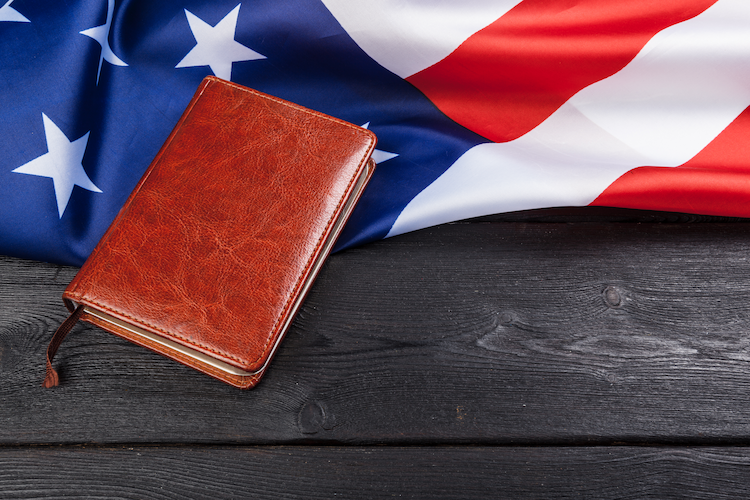First Amendment Case on Tap for SCOTUS’s January Sitting

When the justices return to the bench in January, they are slated to hear a closely-watched First Amendment case involving religious freedom. The case, Shurtleff v. Boston, MA, involves whether the City of Boston violated the Constitution when it rejected a Christian group’s application to fly a flag bearing a Latin cross on a flagpole outside of city hall that is made available to outside groups.
Facts of the Case
The City of Boston allows private groups to hold flag raising events at and on one of its City Hall flag poles “to foster diversity and build and strengthen connections among Boston’s many communities.” Over the course of twelve years, the City approved 284 such flag raisings by private organizations, with zero denials, allowing them to temporarily raise their flags on the City Hall Flag Poles for the limited duration of their events.
When Petitioners’ Christian civic organization, Camp Constitution, applied to raise its flag during a flag raising event to celebrate the civic contributions of Boston’s Christian community, the City denied the request expressly because Camp Constitution’s proposed flag was called “Christian” on the application form. However, other than a common Latin cross on the flag itself, there is nothing to identify the flag as a “Christian” flag.
First Circuit’s Decision
The First Circuit Court of Appeals affirmed the order of the district court granting summary judgment in favor of the City. In reaching its decision, the First Circuit concluded that the City’s permission process and related restrictions for determining which third-party flags are flown from the third flagpole “demonstrate an intent antithetic to the designation of a public forum.”
“The city controls which third-party flags are flown from the third flagpole,” Judge Bruce M. Selya wrote, noting that “all 284 flags previously flown were flags of countries, civic organizations or secular causes.”
The First Circuit went on to find that because the City engages in government speech when it raises a third-party flag on the third flagpole at City Hall, that speech is not circumscribed by the Free Speech Clause. Accordingly, the City is “entitled” to “select the views that it wants to express.” As the First Circuit explained, this entitlement includes both the right to decide not to speak at all and the right to disassociate itself from speech of which it disapproves.
Issues Before the Supreme Court
The Supreme Court granted certiorari on September 30, 2021.The justices have agreed to consider the following questions:
1. Whether the First Circuit’s failure to apply this Court’s forum doctrine to the First Amendment challenge of a private religious organization that was denied access to briefly display its flag on a city flagpole, pursuant to a city policy expressly designating the flagpole a public forum open to all applicants, with hundreds of approvals and no denials, conflicts with this Court’s precedents holding that speech restrictions based on religious viewpoint or content violate the First Amendment or are otherwise subject to strict scrutiny and that the Establishment Clause is not a defense to censorship of private speech in a public forum open to all comers.
2. Whether the First Circuit’s classifying as government speech the brief display of a private religious organization’s flag on a city flagpole, pursuant to a city policy expressly designating the flagpole a public forum open to all applicants, with hundreds of approvals and no denials, unconstitutionally expands the government speech doctrine, in direct conflict with this Court’s decisions in Matal v. Tam, 137 S. Ct. 1744 (2017), Walker v. Texas Div., Sons of Confederate Veterans, Inc., 576 U.S. 200 (2015), and Pleasant Grove City v. Summum, 555 U.S. 460 (2009).
3. Whether the First Circuit’s finding that the requirement for perfunctory city approval of a proposed brief display of a private religious organization’s flag on a city flagpole, pursuant to a city policy expressly designating the flagpole a public forum open to all applicants with hundreds of approvals and no denials, transforms the religious organization’s private speech into government speech, conflicts with this Court’s precedent in Matal v. Tam, 137 S. Ct. 1744 (2017), and Circuit Court precedents in New Hope Family Servs., Inc. v. Poole, 966 F.3d 145 (2d Cir. 2020), Wandering Dago, Inc. v. Destito, 879 F.3d 20 (2d Cir. 2018), Eagle Point Educ. Ass’n/SOBC/OEA v. Jackson Cnty. Sch. Dist. No. 9, 880 F.3d 1097 (9th Cir. 2018), and Robb v. Hungerbeeler, 370 F.3d 735 (8th Cir. 2004).
Oral arguments are scheduled for January 18, 2022.
Previous Articles
Justices Skeptical of Trump Administration Tariffs
by DONALD SCARINCI on December 18, 2025
The U.S. Supreme Court heard oral arguments in Learning Resources, Inc. v. Trump (consolidated with...
SCOTUS Takes Up Key Election Case Involving Mail-In Ballots
by DONALD SCARINCI on December 17, 2025
The U.S. Supreme Court recently granted certiorari in a key election case, Watson v. Republican Nat...
SCOTUS Adds Second Amendment Case to Docket
by DONALD SCARINCI on November 27, 2025
The U.S. Supreme Court will consider another important Second Amendment case this term. The latest ...
The Amendments
-
Amendment1
- Establishment ClauseFree Exercise Clause
- Freedom of Speech
- Freedoms of Press
- Freedom of Assembly, and Petitition
-
Amendment2
- The Right to Bear Arms
-
Amendment4
- Unreasonable Searches and Seizures
-
Amendment5
- Due Process
- Eminent Domain
- Rights of Criminal Defendants
Preamble to the Bill of Rights
Congress of the United States begun and held at the City of New-York, on Wednesday the fourth of March, one thousand seven hundred and eighty nine.
THE Conventions of a number of the States, having at the time of their adopting the Constitution, expressed a desire, in order to prevent misconstruction or abuse of its powers, that further declaratory and restrictive clauses should be added: And as extending the ground of public confidence in the Government, will best ensure the beneficent ends of its institution.





